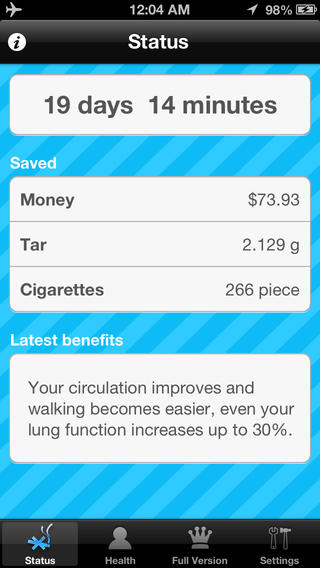 A popular smoking cessation app in the iTunes app store
A popular smoking cessation app in the iTunes app store
Popular smoking cessation smartphone apps in the iTunes App Store and Google Play store still do not include many of the guidelines outlined by the US Public Health Service’s Clinical Practice Guidelines for Treating Tobacco Use and Dependence, according to an article in the American Journal of Preventive Medicine.
This was the second time lead author Lorien Abroms conducted a study on whether apps for smoking cessation followed the Public Health Service's guidelines. The first was completed in June 2009 while the most recent one was completed in February 2012.
"The idea was that couple things had changed," Abroms told MobiHealthNews. "One is, when we did it before, there was no Android platform or apps, so we didn't look at Google Play, so we wanted to take advantage of the fact that now there was Google Play and Android apps. The other thing is evidence for what works had changed or grown, and now we knew that text messaging programs on mobile phones were effective, so we wanted to see if the apps were doing anything that involved text messaging or alerts, because this is the one thing on a mobile phone that has shown how people quit smoking. And the number of apps had increased exponentially."
In the most recent study, while researchers initially pulled out 252 iOS apps and 148 Android apps, they eventually settled on only looking at the most popular ones from each store -- 47 iOS apps and 51 Android apps -- because of a lack of resources. This was another difference between the two studies. The first time Abroms conducted the study, the total number of apps studied, 47 iOS apps, was the total number in the App Store. In both studies, Abroms said there was no data on whether the smoking cessation apps were effective even though they didn't use the approved guidelines.
"Actually, the problem is that there aren't studies already published in literature to see whether they work or don't work," Abroms said. "So this was seen as 'given that we don't have that information let's just at least see whether they do what we have found in the past works in quitting smoking,' -- whether they're doing the things that we have found works across studies such as referring to these recommended practices like making a quit plan, calling a quit line and using medications for quitting smoking."
MobiHealthNews has written about a similar situation in the weight loss community. In that case, a paper evaluated the efficacy of an app based on whether it used evidence-based behavior change strategies rather than assessing whether the apps were effective on their own.
None of the apps included an option or suggestion to call a quit-line, a toll-free number that connects smokers to public health counselors that provide tips on how to quit, which the US Public Health Service has said can more than double a smoker’s chance of successfully ending their habit. Medication to resist cravings, generally recommended for use in conjunction with calling a quit-line, was also not mentioned often -- less than four apps recommended it.
Only 12.2 percent had text alerts, although none of the apps had any text messaging features built in, just push notifications. Many apps also lacked "basic advice" on how to quit smoking and 1 in 5 apps had a functionality for users to set up a quit plan by giving the user social support like a community bulletin board, Abroms said.
This time, Abroms said her team also coded for whether the apps had interactive capabilities (71 percent did) and if the apps gave users personalized advice, which over half did. Often, the personalized advice the apps gave was a calculation of how much money the user was saving.
"One thing that we found, which I think is an important finding is just that the volume of downloads is quite high," Abroms said. "We found that people are, just for looking on Google Play alone, there are over 700,000 downloads per month of these smoking cessation apps... We assume it's global downloads, but compared to other kinds of health seeking, it's quite high. So that's a kind of a good reason to pay attention to these apps and to make sure that the apps are helping people quit smoking because they're being widely used by the public."



















